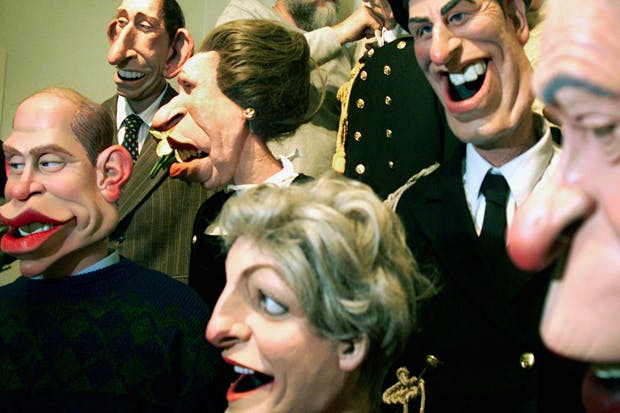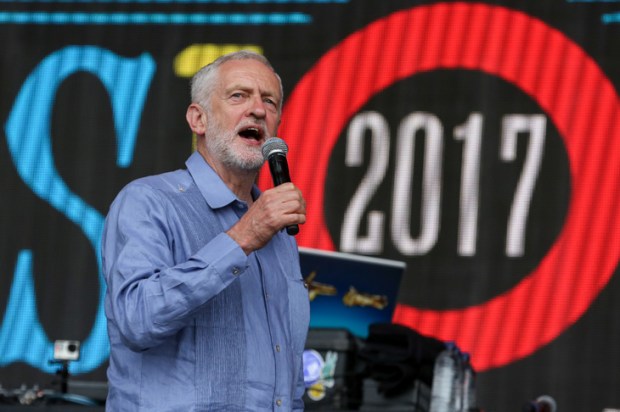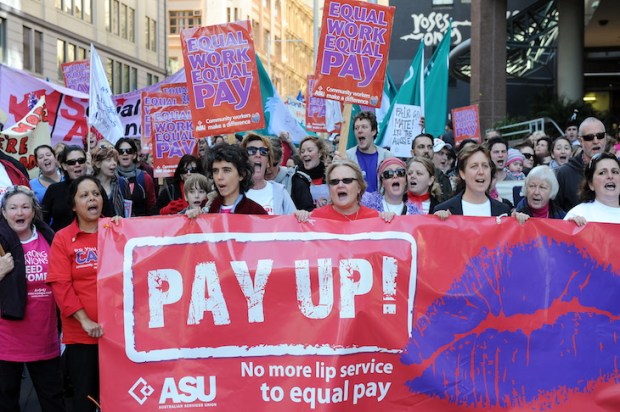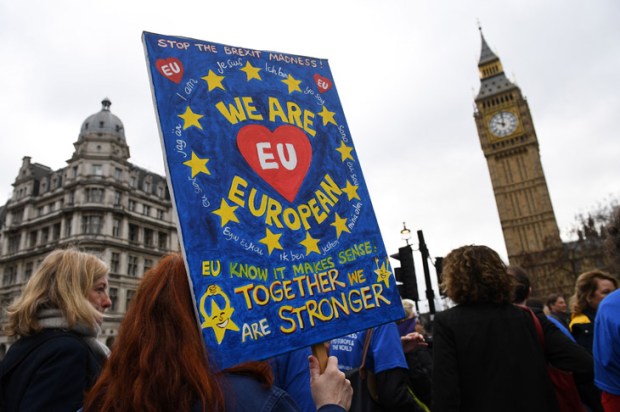I appeared on Radio 4 a couple of weeks ago to discuss the age-old question of whether political satire is dead. I don’t think it is, but it has lost a good deal of vitality in recent years and the role of satire in the general election campaign is a case in point. There has been no shortage of ‘satirical’ television programmes, but none of them have cut through. The only sign of life has been the flurry of photoshopped images on Twitter that have followed each misstep of the parties’ campaigns, such as Ed Miliband’s decision to carve Labour’s election pledges on to an eight-foot stone slab. If Stanley Kubrick was still alive he’d be suing people for illegally reproducing images from the opening scene of 2001: A Space Odyssey.
What accounts for satire’s declining health? I don’t hold with the textbook explanation, which is that standards in public life have sunk so low that nothing a satirist could come up with could be as bad as the reality. This was what Tom Lehrer had in mind when he said political satire died when they awarded Henry Kissinger the Nobel Peace Prize in 1973. The trouble is, every generation thinks politics has hit rock bottom, but it just keeps on getting worse. In 2012, the Peace Prize was awarded to the European Union.
A more plausible theory is that political correctness has made satire much more dangerous. There’s no shortage of big fat targets for satirists to take aim at, but most of them are protected by a praetorian guard of professional offence-takers, ready to take to the airwaves at the slightest sign of disrespect and demand the arrest of the miscreant in question. Or if that doesn’t work, they come round to your place of work and shoot you. If Spitting Image was still on, would anyone involved dare to broadcast a sketch called ‘Miss Arab World’ in which the religious leader of Iran had to judge a parade of Muslim women in full burkas? I doubt it.
But I’m not sure you can blame the decline of political satire on these attacks on free speech. After all, some of the most celebrated works of satire have been produced under the most brutal, oppressive regimes. A case in point is Mikhail Bulgakov’s The Master and Margarita, an indictment of life in the Soviet Union in the 1930s. Admittedly, it wasn’t published until 33 years after Bulgakov’s death, but the fact that satire was considered so subversive by the Soviet authorities gave it a power and importance that it lacks in liberal democracies. Forcing satire underground keeps it alive.
No, I think the reason political satire has lost so much of its bite is because the status of politicians had declined in the past 50 years or so. Back in 1961, when the Establishment first opened its doors, the sight of Peter Cook on stage doing an impression of Harold Macmillan was genuinely shocking because the political class was still looked up to.
Not any more. Today, a satirist expressing a modicum of respect for a politician — Steve Coogan endorsing Ed Miliband, for instance — is front-page news, whereas a comedian showering the Prime Minister with insults goes unnoticed.
In terms of prestige, politicians and satirists have switched places. A successful satirist like Armando Iannucci is respected in a way that no current political leader is. As a result, he enjoys a degree of soft, cultural power that politicians can only dream of. He probably lives in a bigger house, drives a nicer car and earns a higher annual income than most of them, too. Hardly surprising, then, that The Thick of It ran out of steam. What gives a really good satire its seditious power is that it’s an attack of the weak against the strong. The Thick of It, by contrast, was an assault by a clique of rich and powerful satirists on an already beleaguered political class. Not so much slaying giants as tripping dwarves.
Yet I don’t think political satire is dead. I’m sure that it will blossom in the most unlikely of places — Isis-controlled Syria, for instance, or in an American Ivy League university, where any criticism of a protected minority is instant career suicide. The book I’m most looking forward to reading this year is Michel Houellebecq Submission,which is set in a dystopian future in which France has become an Islamic state. Great satire, like great journalism, speaks truth to power, and that means taking on the truly powerful, not mocking an already despised group of white middle-aged men.
Got something to add? Join the discussion and comment below.
Get 10 issues for just $10
Subscribe to The Spectator Australia today for the next 10 magazine issues, plus full online access, for just $10.















Comments
Don't miss out
Join the conversation with other Spectator Australia readers. Subscribe to leave a comment.
SUBSCRIBEAlready a subscriber? Log in